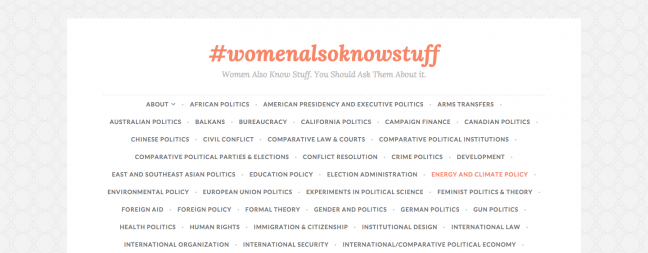Twenty female political scientists in Wisconsin, including three from University of Wisconsin are teaming up to let the world know that “women also know stuff.”
The Women Also Know Stuff website, launched Feb. 5, lists female experts in political science across the country.
Samara Klar, University of Arizona political science assistant professor, got the idea to create the list from a recent Vox article that consulted six political scientists regarding Bernie Sanders’ chances in the presidential election — none of which were female.
“I was looking through the news and I really just became sort of dismayed at the gender imbalance and how experts are presented to the public, and I decided to just go for it, and I put it together really quickly,” Klar said.
Klar encouraged her circle of female political scientist friends to upload their information and then asked them to spread the word to other females in the field, Klar said.
Within a week, the website gained great momentum, as thousands of female political scientists joined the initiative through social media using #womenalsoknowstuff.
“It exceeded [my expectation] by a million times… I never expected it would take off like this,” Klar said. “I thought it maybe would become helpful to a few people or maybe would stimulate people to think about things differently, but I never had any idea that it would spread this broadly.”
Kathy Cramer, a UW political science professor who is featured on the list, heard about the website through Twitter.
She said Klar’s effort is great because the list will help journalists working on tight deadlines and with limited resources. Since it is an all female list, she said it will help women increase their influence in their respective fields.
“Since political science, and especially the study of American politics has been predominantly a male field for many decades, women are still just gaining the attention their male colleagues have had for many years,” Cramer said.
Klar said beyond a desire to decrease the gender imbalance in media, she wanted to change the landscape of conference presentations and panels with the list. She said in conference programs there is typically not more than one female speaker among 15 male speakers. She said all-male panels or all-male speaker series are evidence of a gender gap in the professional world of political science.
Men are usually more visible in the field, Klar said. Since people tend to rely on experts they have recently seen or cited, male dominance in the field is a self-fulfilling prophecy, she said. The phenomenon does not stem from anyone being intentionally sexist or exclusive, but rather implicit biases that people are unaware of within themselves, she said.
Eleanor Neff Powell, a UW political science expert who is also on the website, said it is difficult to change people’s implicit prejudices towards a certain group.
“Scholars, both men and women, have these implicit biases,” Powell said. “These are not deliberate efforts to exclude women from research, but these implicit things make it particularly difficult to find remedies to address these problems.”
Klar now has seven collaborators and they are working together to improve the website, expand it and potentially broaden it to fit other professional areas as well.
Aili Tripp, a UW political science professor and the third UW expert on the list, said in an email to The Badger Herald that she feels strongly about the initiative because it can help raise awareness and solve the problem.
“Selective citing affects the quality of reporting because one does not get a multiplicity of perspectives and one loses out on what 51 percent of the population are thinking when it comes to women, and much more if one counts minority groups,” Tripp said.
Powell said the website is only a small step to end a bigger issue, but all three experts gave suggestions on other ways to address this problem.
Cramer said it would be helpful for female experts who already gained attention to point to their female colleagues who also have a lot to offer. Even male political scientists, Cramer said, can help direct people toward their female colleagues.














